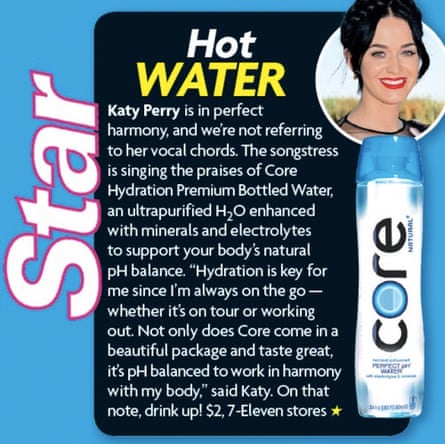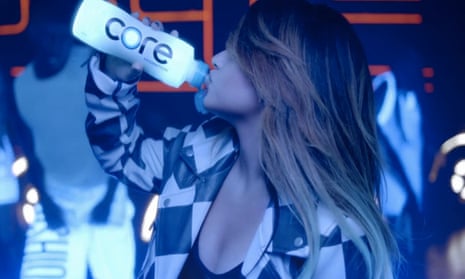You may have seen Core water in any number of music videos. Katy Perry has been quoted as endorsing the “nutrient enhanced” bottled water, which advertises its “science based ingredients”. You may even have bought it at a nearby Whole Foods or 7-Eleven, where the company claims it is “locally made” from nearby municipal tap water.
Manufacturers of premium bottled waters in the US bend over backwards to differentiate themselves. The brand Smartwater positions itself as high-tech: “We one-up mother nature by adding in electrolytes for a clean crisp taste”, reads the product description. Essentia bottled water claims that it is “hydration perfected”.
Core, which is owned by Dr. Luke (aka Lukasz Gottwald) along with partner and bottled-beverage entrepreneur Lance Collins, relies on so-called “brand investors” – mostly musicians, actresses and fitness buffs – to push the product on social media. Musicians Becky G, Adam Levine and G.R.L. have all gone so far as to feature the drink in their music videos. (Gottwald has been most recently in the news for lawsuits brought by pop star Kesha, who is suing him in two states for sexual assault, battery and harassment.)
Yogis @jessicaalba @hot8yoga @baby2baby @Honest @CafeGratitudeLA @KellySawyer @simoneharouche @weHEARTyoga @CoreWater pic.twitter.com/RCIXEoYWw2
— Dr. Luke Doctor Luke (@TheDoctorLuke) July 24, 2014
Water that has been fortified or enhanced – also known as “functional water” – makes up an estimated 11% of the $19.8bn dollar bottled water industry in the US. That’s a considerable chunk of the stateside market, given that functional waters make up less than 6% of the global $107bn bottled water industry, according to data from Euromonitor.
So do Core and its competitors provide a more hydrating, healthful version of water than what flows from the tap?
The short answer is no.
“If you’re eating a normal diet, you’re not adding anything magic [by drinking these waters],” says Michael Sawka, a professor at the School of Applied Physiology at Georgia Tech. Sawka studies hydration and fluid-electrolyte balance among other topics.
Core’s ingredient list says its BPA-free bottles contain reverse osmosis water, calcium chloride, magnesium chloride and potassium bicarbonate. Reverse osmosis is a treatment process that removes dissolved solids, including metals and minerals, as well as pesticides and chemicals such as benzene, when they are present. Minerals such as magnesium and potassium, which also happen to function as electrolytes, are then added back in to the treated water, creating what is essentially mineral water.
The added minerals “are in there for taste and preference, but not for health”, Sawka says.
“As far as them being more hydrating, that’s not the case,” says Allison Childress, a program director and instructor of nutritional sciences at Texas Tech University. Childress says it’s possible that waters with added electrolytes, amino acids or B vitamins could confer a slight benefit to people with poor health, but that benefit would be minimal. “I don’t necessarily think it’s harmful or hurtful, but I don’t think it necessarily works the way they say it works,” Childress says.

Core water declined to comment because “they aren’t at a point where they can share evidence on the water”, according to an email from a press officer from the agency that represents the company. Coca-Cola, which owns Smartwater, and Essentia did not respond to requests for comment.
In most cases, premium waters – and traditional bottled waters – originate from tap water, says Childress. “The number one ingredient is water,” she says.
In fact, the ingredients are so commonplace that it’s possible to approximate the taste of waters such as Core at home. Readily available under-sink reverse osmosis systems can treat tap water, and additives like calcium chloride, magnesium chloride and potassium bicarbonate are all readily available online. Recipes abound for matching the taste of distinctively flavored mineral waters of Europe.
Core also describes its water as having the perfect pH level of 7.4, making it slightly alkaline, though an asterisk on the label indicates that number is an approximation. “As more health conscious consumers become more aware of the harmful effects of an acidic diet and seek ways to bring their body fluids within an acceptable range, Core serves up a solution as it works in harmony with your body’s natural pH balance,” reads a press release from Core’s launch last year. Essentia water is even more alkaline, with a reading of 9.5.
The notion of that an acidic diets create “harmful effects” is one reason alkaline diets, which emphasize whole fruits and vegetables and eschew some wheat and dairy, have been gaining popularity.
But since the idea of eating according to pH was first considered in the 1930s, little conclusive proof has emerged that this type of diet would lead to improved health. (An article from May of that year is titled: “Where once we prated about calories and vitamins we are now concerned with an alkaline balance.”)
Much of the research on alkaline diets shows that eating according to pH only changes the pH of urine, not of the body’s blood. “We can’t really change the pH of our body,” Childress says.
As for a carefully calibrated water pH, Barry Popkin, professor of nutrition and economics at the University of North Carolina, says: “I see no reason and value in this. There is so little scientific evidence that this matters for health.”
Although they are often similar in content, bottled water – including functional and premium water – is regulated by the Food and Drug Administration (FDA), while tap water is regulated by the Environmental Protection Agency (EPA). (As an example of how they differ in their approaches, the FDA does not lay out pH requirements, but the EPA recommends a pH range for safety, not health, of 6.5-8.5.)
Mae Wu, an attorney and chemical engineer with the Natural Resources Defense Council who testified on the problems with bottled water before a senate subcommittee in 2008, says the agencies also differ in the number of employees they devote to enforcement and inspection. The number of EPA inspectors who oversee drinking water dwarfs the number of agents who do the same at the FDA.
Wu says that diminished regulation leads to one of her main concerns about bottled water: it’s a common misconception that “if you can buy it at a store it means someone has okayed it”. “You shouldn’t assume that your bottled water is way better,” Wu says.
In fact, the opposite is often true. “I don’t know of any health benefits of bottled water but I do know of many adverse consequences on the environment and on climate,” says Joseph Graziano, a professor of environmental health sciences at Columbia University’s Mailman School of Public Health. “The production of one bottle of water requires (on average) a third of a bottle of oil to produce it.”
Consumers may feel drawn to bottled water following the crisis in Flint and the investigation of contaminated water at schools in New York and California. “I think that Flint brings up the problem of our aging infrastructure in the US and the need to look again at the regulations, to revamp the Lead and Copper Rule,” says Gretchen Onstad, a professor of environmental and occupational health sciences, who focuses on environmental pollution and drinking water. “I think that if the EPA regulations on drinking water according to the Safe Drinking Water are upheld, that tap water is very safe,” Onstad says.
Consumers in Europe may be justified in having more confidence in their bottled water because the European Commission maintains a list of approved waters by country, from Krusmølle Kilde in Denmark to Vichy Catalán in Spain. The commission sets the labeling requirements and concentration limits for mineral and spring waters. The FDA, on the other hand, maintains no such list in the US.
- This article was amended on 10 April to correct the place of origin for Krusmølle Kilde. The article was further amended on 12 April 2015. An earlier version said incorrectly that Essentia was owned by Coca-Cola.

Comments (…)
Sign in or create your Guardian account to join the discussion